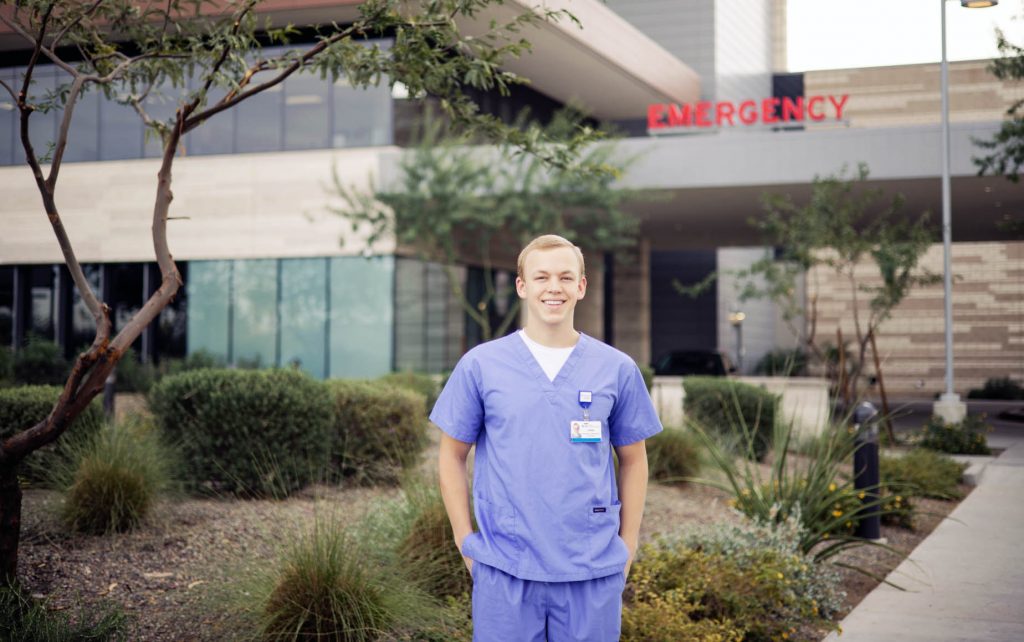
Hans Broman didn’t waste any time. Got to the crux of the matter.
When the then-teen from Eagan, Minnesota, just south of St. Paul, visited Grand Canyon University for the first time on a Discover GCU Trip in high school, he heard a talk by Dr. Mark Wireman, professor in the College of Natural Sciences.
“When Dr. Wireman came and was talking about the biology program, afterward I just asked him, ‘What do you think would be an ideal job to get experience for a pre-physician assistant?’
“He said, ‘Get your EMT certification.’”
Little did Wireman know that casual conversation would become a mission for Broman.
After his freshman year at GCU, the junior biology/pre-physician assistant major spent his summer becoming a certified emergency medical technician.
While many programs span four months at a community college, Broman found a program that required 100 hours of study online and two weeks in person, followed by the EMT National Registry exam.
Broman passed the exam, but he couldn't find a part-time EMT job back home in Minnesota and had to be back at GCU soon for his sophomore year.
He also wasn't sure, once he started school, that he wanted to be an EMT because of the long hours.
So he met with Science and Pre-Health Advisor Chelsea Charbonneau.

“What else could I be doing?” he asked her.
She told him about the Neighborhood Christian Clinic in downtown Phoenix, which provides medical and dental health care services to the uninsured and underserved.
“She said there are a lot of GCU students who volunteer there,” Broman said, and he became one of them, not that he stopped thinking about ways to use his EMT certification.
As luck would have it, one of the friends he went on a mission trip with his freshman year of college worked as an emergency room technician at Banner University Medical Center, the same position Broman was able to land.
He works two 12-hour shifts a week, from noon to midnight, while maintaining a full slate of classes.
“It’s minimum sleep,” he said with a smile.
ER technicians are a combination of EMTs and certified nursing assistants who work in emergency rooms or urgent care facilities, which worked out perfectly for Broman.
“I didn’t know if I wanted to be on an ambulance or not,” he said, which is where you’ll find many EMT-certified health care professionals. “So an ER tech seemed like a cool gig, especially because I’m working alongside doctors and PA’s.”
During the span of 12 hours in the adrenaline rush hustle and bustle that’s the ER, Broman administers IVs and performs electrocardiograms, cardiopulmonary resuscitation and the like.
Working as an EMT is great experience, but it can be demanding when you're a full-time student.
Dr. Mark Wireman, professor, College of Natural Sciences
“It’s helping out the nurses,” he said. “Everything we do is to make their job easier. Everyone has their roles in the emergency room, and just being able to do that? Yeah.”
Broman has wanted to work in the medical field ever since he was in first grade and broke his leg.
His grandfather, a doctor, ran a family practice clinic for 34 years and knew all the best doctors in the Twin Cities area. One of his grandfather’s best friends became his orthopedic doctor.
“That was my first time where I thought, ‘Oh, this stuff is pretty cool.’”
So when he got to high school, he took anatomy and physiology through the College in Schools program.
“I LOVED it and said, ‘Yeah, this is what I want to do.’”
Working as an ER tech hasn’t dissuaded him one bit from his goal of becoming a PA as he works those 12-hour shifts, goes to school, volunteers for the Neighborhood Christian Clinic when he can and, in the midst of it all, is preparing his application for physician assistant school, which will take from two to three years to complete after he earns his undergraduate degree from GCU.
“It’s a daunting process,” Broman said of applying for PA school. “… First looking at it, I was like, ‘Wow! This is a lot of stuff.'”
But Charbonneau has guided him, looking over his personal statement and giving advice.
“It’s really great being at a university where they have resources where you can just meet with someone and their job is to help you through that process,” Broman said.
Daunting process or not, the EMT certification and job as an ER tech are something he hopes will help him present the best application he can. And it all started with that talk with Wireman.

“One day, he (Wireman) said he thought it was cool that I was working while doing school, and I said, ‘You know, you’re the one who told me, pretty much, to go for this job.’ And he thought for a second and said, ‘I actually do remember having that conversation with you!'”
Physician assistant schools typically require 500-2,000 hours of direct patient care experience, Wireman said, and a great way of getting that experience is as an EMT, CNA, medical assistant, phlebotomist and the like.
“Working as an EMT is a great experience, but it can be demanding when you are a full-time student,” Wireman said, adding that it’s rare that a student takes on an EMT position because of the time commitment. “Hans has managed well, and he was able to share patient experiences from his EMT job in our class discussions in pathophysiology.
“He also shared more up-to-date testing that he saw in the real world that we discussed and applied to our class content,” he added.
Broman said his pathophysiology class aligned perfectly with his job, “because we’d learn about certain diseases, and then I’d go to work and see them in real life.”
Being on the job also re-enforced the medical terminology he was learning in school, and the mentorship he received from professionals in his field at a teaching hospital like Banner University Medical Center was invaluable in his preparation for the next step in his career.
Also invaluable was the supportive Christian environment he found at GCU, and not just with the faculty who have guided him, but in the friends he has made.
“I do have a super busy schedule, but I’ve met a lot of cool people who are my godly community who are really able to support me. … The community that I’ve found here has been super helpful.”
Internal Communications Manager Lana Sweeten-Shults can be reached at [email protected] or at 602-639-7901.
***
Related content:
GCU News: Health challenges didn’t stop grad’s college dreams
GCU News: Students help bridge transition for nursing majors
GCU News: Pre-med student has creative pandemic prescription















